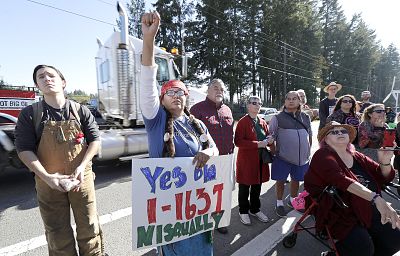Washington Gov. Jay Inslee, who is weighing a 2020 run, is rethinking the carbon tax approach to saving the planet. He believes his party should, too.
WASHINGTON — Gov. Jay Inslee of Washington staked the future of his environmental policy on something activists had advocated for decades: a first-of-its-kind statewide fee on carbon pollution.
But in one of the greenest states in the country, in a historic midterm year for Democrats and amid a spate of new reports warning of climate catastrophe, his efforts to put a price on carbon failed badly.
Undaunted, Inslee is looking to carry the lessons learned from a long career of incremental wins and heartbreaking losses on climate policy to the national stage as a possible presidential contender.
"I learned one of the key talents is persistence," he told NBC News in an interview. "Climate change is not going away, and neither are we."
As a generation of young activists, led by new voices like Rep. Alexandria Ocasio-Cortez, D-N.Y., rise to the forefront, they may want to pull up a seat next to the 67-year-old governor and hear his stories. More than a decade before this year's rallies for a Green New Deal — a plan to spend big on a rapid transition to renewable energy — Inslee, in speeches, op-eds and a book, was calling for a "moonshot" federal project modeled on the Apollo space program to slash emissions.
As a member of Congress, he helped advance a landmark cap-and-trade bill, which failed in the Senate, and he loaded President Barack Obama's stimulus with $90 billion in green initiatives, which passed. As governor, he's led a multipronged effort to boost electric vehicles and support research into clean technology.
His potential entry into the wide-open 2020 Democratic primary contest with a climate-focused campaign comes amid an intense debate over how to marry environmental sustainability with political sustainability, a question he's grappled with like few others. He believes the fate of the world depends on getting the answer right.
"That's what's at stake here," Inslee said. "A fundamental continuation of life and civilization as we've become accustomed to."
The fight for a carbon fee
Over a period of several years, Inslee and activists tried repeatedly to enact a fee on carbon emissions via legislation and ballot initiatives, an idea long backed by economists as a way to nudge consumers toward clean energy.
In interviews, participants in the efforts described a series of well-intentioned plans brought down by opposition from industry groups that spent tens of millions of dollars, infighting among activists and skepticism among voters.
The initial attempt began outside the Inslee administration in 2016, when a group called Carbon WA led a campaign for a ballot measure, Initiative 732, that would have taxed carbon emissions and use the revenue to cut taxes elsewhere.
Supporters emphasized its political appeal. There is at least some support for the concept of a revenue-neutral carbon tax in conservative circles, since it doesn't entail an overall tax hike, and Carbon WA earned backing from three Republican state senators.
But the proposal also failed to garner support on the left, where activists favored using the additional revenue on investments to cut further emissions and to finance related "green jobs" in low-income communities. The national Sierra Club opposed 732 even as it acknowledged dissension among its members over the decision.
Inslee opposed it, too, in part over concerns that the revenue projections were off.
With the environmental community split, the measure garnered just 40 percent of the vote and lost every county outside of Seattle.
"Politically, both approaches are challenging," said Yoram Bauman, an economist who led the Carbon WA campaign and now works on energy policy in Utah, referring to courting Republicans with new tax cuts and uniting the left by putting the money into its priorities. "It's very difficult to tell a story about how the Democrats take over the world. But it's also difficult to tell a story about how you get enough Republicans and Democrats on board with some kind of centrist climate policy."
In 2018, Inslee and his allies looked to improve on the idea with a new plan to enact a carbon fee and use it to fund a variety of clean energy projects. They built a coalition of labor unions, environmentalists, racial justice groups, faith organizations and businesses to promote it.
The investment side was especially important, Inslee said, because his administration estimated about 90 percent of his proposal's carbon reductions came from its various green programs, rather than changes in consumer behavior due to higher energy prices. But he still saw the carbon fee as a "signal to inspire businesses and consumers to move to a less carbon intensive product" that could provide a foundation for future policy.
Despite Inslee's support, a bill to enact his plan stalled in the narrowly Democratic-controlled state Senate. That left a direct appeal to voters as a last resort. Another ballot measure, Initiative 1631, which would create a carbon fee, was born.
Inslee backs down
With a larger coalition, however, came a larger response from affected industries. Led by oil companies, opponents spent a state-record $31 million to defeat Initiative 1631 last year, about double the amount spent by supporters, who had their own backup from billionaires Michael Bloomberg and Bill Gates.
The "no" campaign pointed to higher energy costs for consumers. But in a move that could be a preview of future fights on the national level, the opponents' message focused heavily on splitting the left with accusations that 1631 exempted too many polluters and would not fund effective programs.
"Voters rejected I-1631 because they understood it was a flawed initiative that would have significant economic impacts on the state's economy while doing very little to meet carbon reduction goals in the state," said Catherine Reheis-Boyd, president of the Western States Petroleum Association, which helped spearhead opposition to the plan.
The attacks were effective. Even as Democrats made gains in the legislature with environmentalist candidates, the initiative failed and improved only modestly on its 2016 predecessor with 43 percent of the vote.
Inslee has since backed off a carbon fee for now at the state level, instead focusing on a package of renewable energy investments financed by other means. And he's grown skeptical as to whether Democrats should pursue a similar policy nationally if it distracts from other green priorities.
"You can get enormous benefit without, perhaps, a carbon-pricing system," he said. "That should not totally take it out of consideration, but there's many, many ways to skin this cat."
State Sen. Reuven Carlyle, a Democrat who has quarterbacked Inslee's climate agenda in the legislature, said he still believes lawmakers need to put a price on carbon someday. But with voters unconvinced, it's better to bring emissions down elsewhere, Carlyle said.
"We need to go back to the drawing board and respect the will of the voters," he said.
Democrats, listen up
In many ways, the emerging national picture on climate policy looks similar to what Inslee has faced.
Heading into the presidential campaign, there's a burst of grassroots energy around the Green New Deal, but it faces competition from similarly ambitious Democratic proposals on health care, education, taxes and more.
Inslee hasn't ignored those items (he just proposed a new public health care option in his state), but he has a message Democratic voters might not hear from the party's presidential candidates: If you're going to tackle climate change, the rest may have to wait.
"When you want college education for your kids, when you want better health care, when you want net neutrality, when you want all of those things, but your house is on fire and it's burning down, you've got to put the fire out first and get your family out of the house," he said.
"That's the type of prioritization we have to make if we are going to succeed in rescuing our country from this existential threat," he added.
With an uncertain policy path forward, national Democrats are facing debates much like the ones environmentalists faced in Washington state.
Young activists in groups like the Sunrise Movement are focused on a massive jobs program to help transition the economy away from fossil fuels. But some Democrats are also pursuing a revenue-neutral carbon tax with GOP support. Before he left the Senate this month, Jeff Flake of Arizona signed onto a carbon tax with Sen. Chris Coons, D-Del.
Having just faced a voter backlash of his own, though, Inslee has grown wary of a national plan that leans strongly on a carbon tax to slash emissions.
"To actually get carbon savings, you need to jack up the price so high that it becomes politically untenable," he said.
The better option, in his eyes, is to look to taxes on the wealthy to fund a Green New Deal. Reversing portions of the Trump tax cuts could provide an easier source of financing, he said.
But if that doesn't fly either, then it's on to the next plan and the one after that. If there's one message the battle-scarred governor has for young voters and Democratic presidential hopefuls, it's not to give up when things go sour.
"As Churchill said, victory is the only option, because without victory there is no survival," Inslee said.













